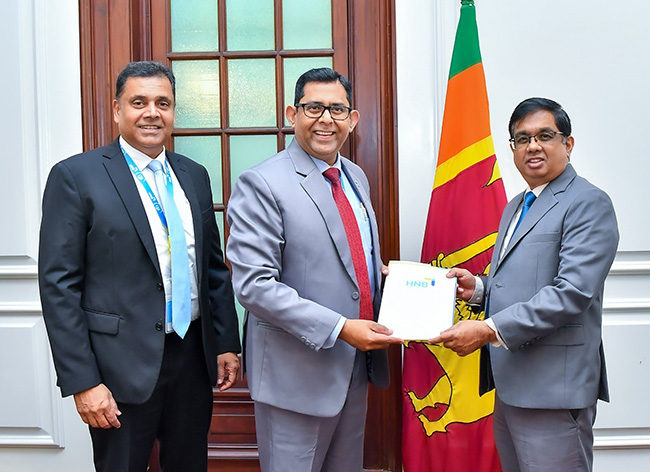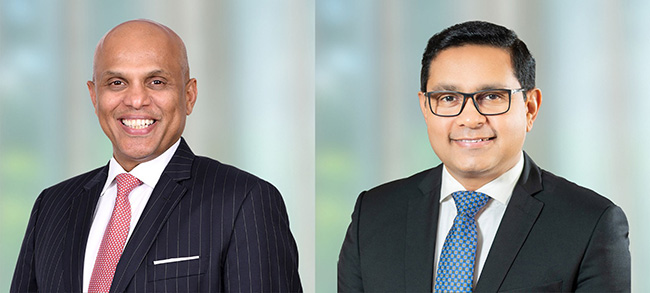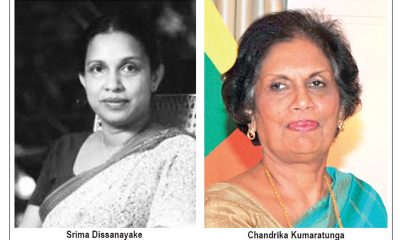Business
Multi-sectoral collaboration vital for Sri Lanka to achieve Universal Health Coverage

The Institute of Policy Studies of Sri Lanka (IPS) together with the Sri Lanka Medical Association (SLMA) and the Center for Policy Impact in Global Health (CPIGH) of the Duke University, USA organised a virtual policy dialogue on ‘Planning for Universal Health Coverage amidst the 4Ds of Health Transitions’ on 25 August 2021. The dialogue was structured around a recent IPS study aimed at understanding how government, donors and key country stakeholders in the health sector perceive these transition challenges and their impact on the progress towards UHC, where they see the biggest gaps emerging, and what actions can help to address these challenges and gaps.
Health sector experts who spoke at the Dialogue flagged the need for multi-sectoral collaboration to achieve universal health coverage (UHC) in Sri Lanka.
Commencing the discussion, Dr Nisha Arunatilake, Director of Research, IPS explained that there are four major, inter-linked transitions in diseases, demography, development assistance for health and domestic health financing – the “4Ds” of global health transition – that complicate Sri Lanka’s efforts to achieve UHC. The associated challenges of these have been worsened by the COVID-19 pandemic. In this context, IPS and Duke University have conducted research that brings into focus the importance of achieving UHC and the sustainable development goals (SDGs).
Speaking next, Dr Padma Gunaratne, President, SLMA reflected on some of the achievements of the national health system including increased life expectancy and quality of healthcare. She noted that while these achievements are commendable, inequities and inefficiencies in healthcare continue to persist and a meaningful dialogue on planning for UHC is most timely.
Delivering the keynote address thereafter, Dr S Sridharan, Deputy Director-General (Planning), Ministry of Health pointed out that donor support for the health sector is declining. Meanwhile, there is rising demand for health services, an ageing population, and inadequate domestic financing for health. He recommended seven steps to address the challenges: (1) strengthening community response systems; (2) supporting reproductive health – adolescence, maternity and new-born health; (3) supporting platforms for integrated service delivery; (4) strengthening country population and supply chain; (5) investing in human resources (HR) for health and data systems for health; (6) strengthening and aligning national and global strategies; and (7) strengthening financial management and oversight.
The next speaker, Ipchita Bharali, Policy Associate, Duke University provided the audience with evidence on health transitions in an international context. She stated that many Middle-Income Countries (MICs) are expected to transition away from concessional multilateral and bilateral development assistance soon. However, they still face several health sector challenges such as high mortality rates, weak health systems, and large pockets of poverty in the countries. These challenges are intensified with the onset of the COVID-19 pandemic.
Session 1: Knowledge, capacity, and policy gaps that hinder UHC progress in Sri Lanka in the context of the 4Ds of health transitions and potential opportunities to tackle these gaps.
Knowledge gaps and opportunities
Ashani Abayasekara, Research Economist, IPS presented a summary of the study findings identifying the knowledge gaps. One of the findings highlighted was the rising burden of NCDs, as there was an acute focus on curing such illnesses by only considering drugs as the solution and understanding them as disease issues and not health issues. Prominence was also given to the gender disparities regarding NCDs. Lack of detailed and accurate data, poor research and development (R&D), and knowledge dissemination were some of the many gaps that were further identified as areas that needed immediate action.
Dr Susie Perera, Deputy Director-General (Public Health Services II), Ministry of Health in her reflections explained that one of the ways of alleviating the gaps is by targetted investments and incentivising stakeholders to conduct proper R&D, data collection, and knowledge dissemination. She noted that Sri Lanka has had many opportunities to strengthen its primary health and education systems with donor support, both of which are relevant to reducing the NCD burden. “A whole of government, multi-sector approach is needed,” she emphasised adding that digital literacy needs to be fostered in the health sector, along with a culture of innovation.
Prof. Amala De Silva, Professor in Economics, University of Colombo shared similar sentiments and noted that NCDs have an indirect relationship with economic performance. She flagged the need for multidisciplinary studies and proper accountable agency in research activities to achieve UHC in Sri Lanka.
Capacity gaps and opportunities
Thisali de Silva, Research Assistant, IPS presented the findings of the study on the capacity gaps that hinder UHC in the country. Poor financial and HR capacity was found to be the notable gaps in Sri Lanka. Some of the financial capacity gaps included inefficiencies in financial allocation, and financial management issues to name but two. On the other hand, the lopsided distribution of medical professionals and the lack of engagement in the financial side of the health sector have made for concerning capacity gaps in labour.
First to give thoughts on the study was Dr Dileep de Silva, Head of Human Resource Department, Ministry of Health. On the HR front, he explained that the issue in the lopsided distribution of medical professionals was due to the low applicants especially when looking at nurses, therapists, midwives and PHIs. Furthermore, one of the major reasons for the financial capacity gaps is a result of the underutilisation of capital budgets for the health sector.
Dr Anuji Gamage, Senior Lecturer in Community Medicine, Sir John Kotelawala Defence University identified healthcare migration as a problem driven by economic factors, unsatisfactory work environment, and professional career opportunities. She stated that a way of solving the uneven distribution of labour is a mechanism that would assure safety, and this is particularly important in a time of a global pandemic. “It is important to use strategies to keep the workforce safe and improve their wellbeing,” she affirmed.
Policy gaps and opportunities
The frequent changes made to the number of ministries, reversal of implemented policies and several other implementation hurdles, especially at the provincial level were shown to be some of the major policy gaps identified through the study. Ashani Abayasekara highlighted several opportunities to focus amid all these gaps such as creating a knowledge hub, and collaboration and coordination with non-state sectors.
Dr Ruvaiz Haniffa, Past President, SLMA in his reflections, called for a grassroots level approach through family doctors and homecare. “Too many people are currently missing out on health coverage in the primary preventive care sector. We have not put in policies in the primary curative sector,” he said stressing that the need of the hour is to provide holistic primary curative care. Uditha Palihakkara (Past Chairman of the Finance Commission), speaking in his personal capacity, expressed the view that the policy gaps are a result of low national budgets to the health sector as a whole.
Session 2: Multi-sectoral collaboration for Sri Lanka’s health systems – reflections from development partners, private sector, academia and civil society.
Based on the study, Dr Deepika Attygalle, Senior Health Specialist, World Bank and Ms Shiranthi Rathnayake, Additional Director General, Department of National Planning asserted that multi-sectoral collaboration is vital for Sri Lanka’s goal of achieving UHC of which, collaboration between the finance and medical sectors is particularly important. Dr Olivia Nieveras, Public Health Administrator, World Health Organization spoke about how donors should more agile in their activities. Sampath Manthreenayake, Additional Director-General, Department of External Resources added that there should be a collective system for better results on donor financing.
Way Forward
Moderated by Dr Nisha Arunatilake, a fruitful question and answer session took place with several important questions raised from participants around the world. The proceedings were wrapped up with an iteration on the need for a strong primary curative healthcare system and multi-sectoral collaborations as the way forward.
Link to original blog: https://www.ips.lk/talkingeconomics/2021/08/27/multi-sectoral-collaboration-vital-for-sri-lanka-to-achieve-universal-health-coverage/
Business
David Pieris Group expands global footprint with investment in Dubai-based Navire Logistics

The David Pieris Group continues to strengthen its international presence with the acquisition of 50% ownership in Navire Logistics Services L.L.C, (www.navirelogistics.com) a reputed logistics company based in Dubai and Oman. This strategic move marks a significant milestone in the Group’s journey towards expanding its operations beyond Sri Lanka and positioning itself in the international markets.
In Sri Lanka, the Group’s logistics arm, D P Logistics (Private) Limited (DPL), has already established itself as a comprehensive logistics solutions provider — covering warehousing, transportation, freight forwarding, project logistics, inland distribution and custom house brokering.
DPL currently ranks among the top ten players in warehousing and 3PL operations and holds one of the largest container fleets amongst the logistics companies in the country. Despite operating in a highly fragmented freight forwarding market, DPL continues to capture a growing share, reinforcing its reputation as one of the very few local companies with expertise across all logistics disciplines.
David Pieris Group also acquired in 2022, Pulsar Shipping Agencies (Pvt.) Limited, the shipping arm of Expolanka Holdings PLC to expand its Logistics & Shipping Cluster into ship agency, husbandry services and marine logistics.
Leveraging this strong domestic foundation, DPL has now extended its capabilities to the international stage through its partnership with Navire Logistics Services L.L.C. The company’s expertise in custom house brokering, freight forwarding, cargo consolidation, warehousing, and transport solutions will be integrated into Navire Logistics’ operations, enhancing service quality and efficiency across the Middle East and South Asia.
The investment also extends to operations in Oman through a fully owned subsidiary, with further expansion plans already underway to establish operations in Saudi Arabia, Thailand, and India — strengthening the Group’s regional logistics network.
Business
HNB strengthens national response to Cyclone Ditwah

HNB PLC has contributed of Rs. 100 million towards the Rebuild Sri Lanka Fund, reinforcing its commitment to national recovery efforts following the devastation caused by Cyclone Ditwah.
“On behalf of HNB, I wish to convey our solidarity with all our fellow Sri Lankans, especially those severely affected by Cyclone Ditwah. As a home-grown institution, our connection to the communities we serve runs deep. Many of our customers and colleagues have been directly or indirectly affected, and we are committed to standing with them during this difficult time and supporting them as they rebuild.”
“HNB’s contribution to the Rebuild Sri Lanka Fund is a sign of our commitment to this collective mission. We recognize that this is going to be a long and challenging process, but we stand ready and committed to support both the immediate and long-term recovery effort,” HNB Managing Director/ CEO, Damith Pallewatte stated.
Complementing its direct financial support to the Fund, HNB has also launched a nationwide disaster relief initiative as the first phase of a broader, coordinated response from the bank.
As part of the program, the Bank donated over 2,500 essential relief and nutrition packages to support displaced families, with the consignments formally handed over to the Sri Lanka Army to ensure structured, transparent, and equitable distribution across the impacted areas of Kandy, Gampaha, Kaduwela, and Hanwella, while separate packages were provided to affected employees to strengthen their personal recovery.
Business
ComBank ranked No 1 in Business Today’s Top 40 for 2024–25

The Commercial Bank of Ceylon has been ranked No 1 in the Business Today Top 40 for 2024–25, reaffirming its position as Sri Lanka’s best-performing bank and one of the country’s top five strongest corporate entities for the 17th consecutive year.
Business Today assigned the Bank an aggregate score of 37.65, placing it at the top of its latest ranking of leading Sri Lankan enterprises.
In its presentation of the rankings, Business Today described Commercial Bank as “a beacon of resilience and renewal after a defining year,” noting that 2024 was shaped by strategic transformation, disciplined execution, and unwavering commitment to long-term sustainable growth. The publication recognised the Bank’s strength across key business lines, its deepened customer focus, and a performance trajectory that reinforced its reputation as Sri Lanka’s most resilient and customer-centric financial institution.
Reflecting on the ranking, Mr Sanath Manatunge, Managing Director/CEO of Commercial Bank said: “Being ranked No 1 in the Business Today Top 40 is a powerful endorsement of the discipline, resilience and purpose with which we steered the Bank through a year of tough conditions and decisive transformation. Our performance in 2024 was defined by navigating turbulence without losing sight of our priorities: strengthening fundamentals, supporting customers, and preparing the institution for long-term growth. This ranking is not merely an award; it is confirmation that our strategy is delivering results and that the Bank is firmly positioned to contribute to national progress with renewed confidence.”
Business Today also highlighted the Bank’s record-breaking financial performance during the year. The magazine quoted Mr Sharhan Muhseen, Chairman of Commercial Bank as saying that the Bank had delivered the highest profits in its history, and attributing this outcome to a disciplined focus on efficiency, digital innovation, and customer-centred transformation. These qualities, the publication stated, enabled the Bank to strengthen its market position and make meaningful contributions to economic recovery.
Among the milestones recognised were an equity capital infusion of Rs. 22.54 billion through a rights issue and the raising of Rs. 20 billion in Tier II capital via a debenture issue.
-

 Midweek Review4 days ago
Midweek Review4 days agoHow massive Akuregoda defence complex was built with proceeds from sale of Galle Face land to Shangri-La
-

 Features7 days ago
Features7 days agoWhy Sri Lanka Still Has No Doppler Radar – and Who Should Be Held Accountable
-

 News3 days ago
News3 days agoPakistan hands over 200 tonnes of humanitarian aid to Lanka
-

 News3 days ago
News3 days agoPope fires broadside: ‘The Holy See won’t be a silent bystander to the grave disparities, injustices, and fundamental human rights violations’
-

 Latest News6 days ago
Latest News6 days agoLandslide early warnings in force in the Districts of Badulla, Kandy, Kegalle, Kurunegala, Matale, Nuwara Eliya and Ratnapura
-

 News4 days ago
News4 days agoBurnt elephant dies after delayed rescue; activists demand arrests
-

 Features7 days ago
Features7 days agoSrima Dissanayake runs for president and I get sidelined in the UNP
-

 Editorial7 days ago
Editorial7 days agoDisaster relief and shocking allegations












